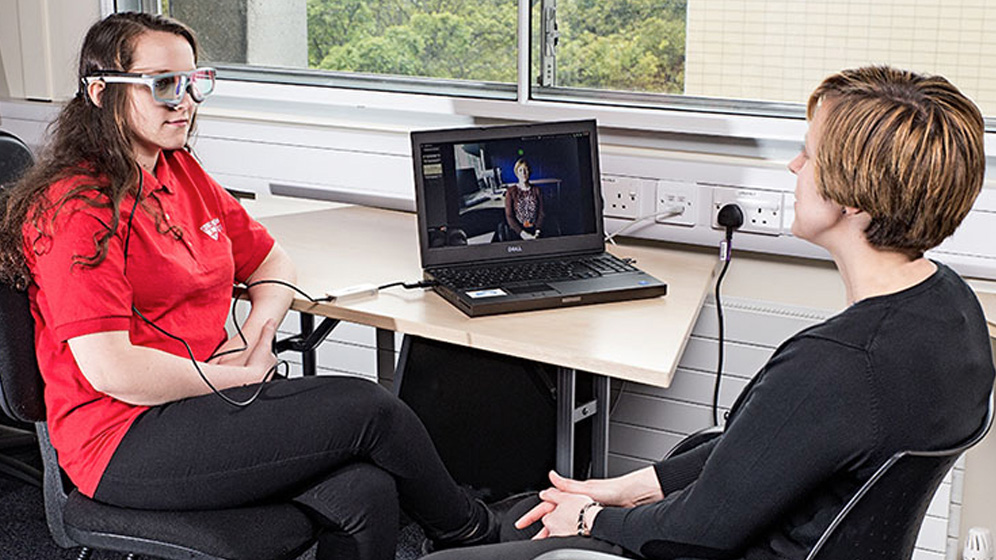Cognitive Science BSc Honours
- UCAS code: C859
- Full time
- 3-4 years
Explore how humans think, learn, behave, and communicate. This interdisciplinary degree combines the study of psychology, linguistics, computer science, and philosophy.
You are currently viewing course information for entry year: 2026
Next start date:
- September 2026
UCAS Institution name and code:
- NEWC / N21
Course overview
Are you curious about how the human mind functions? Fascinated by how people communicate effectively? Interested in why technologies aren’t always accessible?
Cognitive Science, like psychology, aims to understand the mind's complexities and how the brain's mental processes influence behaviour. It emerged in the 1950s as a response to Behaviourism, which argued that behaviour is shaped by past experiences and conditioning. This theory became difficult to defend, especially for researchers studying language development, which Behaviourism couldn’t explain.
Cognitive Science developed as an interdisciplinary field, bringing together insights from psychologists, linguists, computer scientists, and philosophers. This shift led to key breakthroughs in understanding language, perception, memory, and decision-making.
This degree explores key cognitive functions like perception, attention, memory, and language. You’ll understand the various methods used to explore behaviour and understand the strengths and limitations of different approaches.
By studying modules from across the University, you’ll come to understand:
- The structure and function of the human mind and brain
- The development and evolution of human language and communication
- How AI impacts the way we think and communicate
You’ll graduate with the ability to combine critical thinking and problem-solving skills with the knowledge and understanding to reshape our future.
Your course and study experience - disclaimers and terms and conditions
Please rest assured we make all reasonable efforts to provide you with the programmes, services and facilities described. However, it may be necessary to make changes due to significant disruption, for example in response to Covid-19.
View our Academic experience page, which gives information about your Newcastle University study experience for the academic year 2025-26.
See our terms and conditions and student complaints information, which gives details of circumstances that may lead to changes to programmes, modules or University services.
Quality and ranking
Professional accreditation and recognition
All professional accreditations are reviewed regularly by their professional body.
Modules and learning
Modules
The information below is intended to provide an example of what you will study.
Most degrees are divided into stages. Each stage lasts for one academic year, and you'll complete modules totalling 120 credits by the end of each stage.
Our teaching is informed by research. Course content may change periodically to reflect developments in the discipline, the requirements of external bodies and partners, and student feedback.
Optional module availability
Student demand for optional modules may affect availability.
Full details of the modules on offer will be published through the Programme Regulations and Specifications ahead of each academic year. This usually happens in May.
To find out more please see our terms and conditions
You'll be introduced to a broad base of theoretical frameworks. They will set you up with a strong foundation for the rest of your degree. You'll explore cognitive psychology, language structure, philosophy, and basic skills for dealing with quantitative and computational data.
Modules
You’ll delve deeper into language development, current theory and practice in psychological science, and applied data analysis.
You'll choose from a wide range of optional modules to focus in more depth on topics that interest you. Modules will include topics such as social psychology, second language acquisition, philosophy of science, and experimental methods in behavioural science.
Modules
| Compulsory Modules | Credits |
|---|---|
| Cognitive Neuroscience | 10 |
You'll put the knowledge and skills from Stages 1 and 2 into practice. You'll undertake your own research in an independent project with cross-disciplinary supervision. Alongside this, you’ll take advanced modules in linguistics and psychology. You'll also have the the option of integrating modules from other disciplines.
Please note: Some modules are currently listed as inactive. These modules are not offered in 2025/26.
| Compulsory modules | Credits |
|---|---|
| Empirical Project for Cognitive Science | 40 |
You can also take the following modules:
- Origins and Evolution of Language (20 credits)
- The History of Linguistic Ideas (20 credits)
- It's not what you say, it's how you say it: Prosody and intonation (20 credits)
- Comparative Syntax: English in a cross-linguistic context (20 credits)
- From Input to Output: The Blackbox of Child Language Acquisition (20 credits)
We base these figures and graphs on the most up-to-date information available to us. They are based on the modules chosen by our students in 2024-25.
Teaching time is made up of:
- scheduled learning and teaching activities. These are timetabled activities with a member of staff present.
- structured guided learning. These are activities developed by staff to support engagement with module learning. Students or groups of students undertake these activities without direct staff participation or supervision
Teaching and assessment
Teaching methods
You'll be taught through a combination of:
- lectures
- seminars
- workshops
- computer-based lab sessions
- practical sessions
- field work
Assessment methods
You'll be assessed through a combination of:
-
Case studies
-
Dissertation or research project
-
Essays
-
Examinations – practical or online
-
Group work
-
Presentations
-
Reflective report/journal
-
Reports
-
Seminar tasks/exercises
Skills and experience
You'll learn to integrate and apply theoretical perspectives from core disciples of cognitive science including:
- psychology
- linguistics
- philosophy
- computer science
You’ll hone skills in:
- persuasive and scientific writing
- effective presentation of cross-disciplinary research
- quantitative analysis and data visualisation
- basic computer programming
Research skills
In Stage 3 you'll undertake an independent research project. This will be a cross-disciplinary collaborative supervision from at least two core cognitive science disciplines. It will give you the chance to integrate critical and technical skills to address open questions in cognitive science. This will allow you to produce new and innovative interdisciplinary research. This independent, research project also allows you to show your learned knowledge. It'll also allow you to develop your skills, techniques and understanding.
Our staff have world-leading expertise in:
- comparative approaches to human cognition and behaviour
- machine learning and analysis of large-scale behavioural/language datasets
- evolutionary and developmental approaches to human language
- intimacy, sexuality, family, childhood, and education
- digital labour, platform economies and neoliberalism
- media ethics
Opportunities
Professional Placements
You can apply for a professional placement between Stage 2 and Stage 3. This is Subject to eligibility. The School of Psychology placement team secure and advertise a wide range of placements. Examples of previous placements have been in the NHS Foundation Trust, Northumbria Police, University research institutes and local mental health support charities. National placement opportunities are also advertised, for example, at Great Ormond Street Hospital. If successful in securing a placement, you will be supported by the placement team. They will support you whilst preparing for and undertaking your placement. Placements are an excellent opportunity for you to apply the knowledge and skills you have learned in a practical context. They are an opportunity to gain an important advantage in a competitive job market.
Study Abroad
You can study abroad for a year at a university in a different country. Currently, we have partnership agreements with universities in the US, Canada, and Sweden. We continually expand our global study opportunities. The international study year takes place between Stages 2 and 3. To join the international study you need to apply for a place and numbers are limited.
Find out more information on studying abroad. We will provide further information during your course.
Careers Placements
Get career ready with a work placement and leave as a confident professional in your field. You can apply to spend 9 to 12 months working in any organisation in the world. You'll receive University support from our dedicated team to secure your dream placement. Work placements take place between stages 2 and 3.
You'll gain first-hand experience working in the sector, putting your learning into practice, and developing your professional expertise.
If you choose to take a work placement, it will extend your degree by a year. Your degree title will show you have achieved the placement year. Placements are subject to availability.
Facilities and environment
Facilities
As a Cognitive Sciences student at Newcastle University, you'll be based in the School of Psychology's Dame Margaret Barbour Building. This is located on the University's city-centre campus.
The School of Psychology is around a ten minute walk from Newcastle city centre. It also has great access to libraries, the student union and sports centre facilities.
You'll also have access to our excellent practical facilities in the School, such as:
- a forensic interviewing suite
- a media and behaviour lab
- medical consultation rooms
- psychological testing cubicles
You'll also have access to the linguistics lab in the School of English Literature, Languages and Linguistics. The linguistics lab includes:
- a sociolinguistic interview suite
- a child language acquisition lab
- ultrasound tongue imaging
- state of the art recording equipment
Support
You will have an academic member of staff as a personal tutor throughout your degree. They can help with academic and personal issues.
All first-year students join a study group of approximately 15 students, led by an experienced and trained final-year Psychology student who will also act as your Peer Mentor for your first year.
Your future
Opportunities for diverse career paths
The multidisciplinary nature of this degree will result in a broad and versatile set of skills. The critical thinking, problem-solving and analytical skills you’ll develop will make you an attractive hire in almost any graduate job in the contemporary job market. Cognitive Sciences graduates will be well suited to work in a variety of sectors including:
- artificial Intelligence
- data science
- user experience testing or human computer interaction
- technical and educational consulting
- assistive technology
- healthcare roles in technology, mental health services or administration.
- government policy
- behavioural science or research
Many of our graduates embark on further study, including master's degrees and PhDs. Some go on to pursue careers in academia and research.
Careers support
Our Careers Service is one of the largest and best in the country, and we have strong links with employers. We provide an extensive range of opportunities to all students through our ncl+ initiative.
Visit our Careers Service website
Recognition of professional qualifications outside of the UK
If you’re studying an accredited degree and thinking about working in Europe after you graduate, the best place to find current information is the UK Government’s guidance on recognition of UK professional qualifications in EU member states. This official resource explains whether your profession is regulated in another country, what steps you need to take, and which organisation you should contact.
Entry requirements
All candidates are considered on an individual basis and we accept a broad range of qualifications.
The entrance requirements and offers below apply to 2026 entry.
| A-Level | |
|---|---|
| International Baccalaureate | |
|---|---|
Other UK and the Republic of Ireland qualifications
Alternative offers at Newcastle
Through one of our contextual or alternative offer routes, you could receive an offer of up to three grades lower than the typical requirements.
Contextual offers
We use certain contextual data from your UCAS form, alongside your application, to consider challenges that you may have faced in your education and the potential effect this may have had on your qualifications. This means you may be eligible to receive a lower contextual offer.
PARTNERS offers
One of the largest and longest support entry routes to university of its kind for students from underrepresented backgrounds. We support applicants from application through to study.
Realising Opportunities offers
A unique programme delivered in collaboration with 10 leading, research-intensive universities in the UK. The programme is open to students in Year 12/first year of college.
Pathways to Newcastle offers
Pathways to Newcastle, our national skills entry route, is available for specific subject areas.
High Performance Athletes
We support promising athletes at the application stage, who compete in regional, national or international levels in their sport.
Qualifications from outside the UK
English Language requirements
Entrance courses (INTO)
International Pathway courses are specialist programmes designed for international students who want to study in the UK. We provide a range of study options for international students in partnership with INTO.
These courses are specifically designed for international students who want to study in the UK and progress onto one of our undergraduate degrees. Our International Study Centre, has a range of study options including:
- International Foundation
- International Year One
- English Language courses
Find out more about International Pathway courses
Admissions policy
This policy applies to all undergraduate and postgraduate admissions at Newcastle University. It is intended to provide information about our admissions policies and procedures to applicants and potential applicants, to their advisors and family members, and to staff of the University.
University Admissions Policy and related policies and procedures
Credit transfer and Recognition of Prior Learning
Recognition of Prior Learning (RPL) can allow you to convert existing relevant university-level knowledge, skills and experience into credits towards a qualification. Find out more about the RPL policy which may apply to this course.
Tuition fees and scholarships
Tuition fees for academic year 2026-2027
The 2026 entry home fees have not yet been confirmed.
| Qualification: BSc Honours | |
|---|---|
|
Home students full time 3-4 years |
Tuition fees (Year 1)
Not set |
|
International students full time 3-4 years |
Tuition fees (Year 1)
30,900 |
Year abroad and additional costs
For programmes where you can spend a year on a work placement or studying abroad, you will receive a significant fee reduction for that year.
Some of our degrees involve additional costs which are not covered by your tuition fees.
Scholarships
Find out more about:
Open days and events
You'll have a number of opportunities to meet us throughout the year at our on-campus and virtual open days.
You'll be able to:
- explore our beautiful campus
- find out about our vibrant city
- discover what students think about studying at Newcastle
You'll also have the opportunity to speak to academic staff and find out more about the subjects you're interested in.
Find out about how you can visit Newcastle in person and virtually.
We regularly travel overseas to meet with students interested in studying at Newcastle University. Visit our events calendar to find out when we're visiting your region.
How to apply
Apply through UCAS
To apply for undergraduate study at Newcastle University, you must use the online application system managed by the Universities and Colleges Admissions Service (UCAS). All UK schools and colleges, and a small number of EU and international establishments, are registered with UCAS. You will need:
- the UCAS name and institution codes for Newcastle University (NEWC/N21)
- the UCAS code for the course you want to apply for
- the UCAS 'buzzword' for your school or college
If you are applying independently, or are applying from a school or college which is not registered to manage applications, you will still use the Apply system. You will not need a buzzword.
Apply through UCASApply through an agent
International students often apply to us through an agent. Have a look at our recommended agents and get in touch with them.
Get in touch
By phone
Call us on +44 (0) 191 208 3333 and press option 1. Our opening hours are Monday to Friday 10am until 4pm.
Live chat
Our NCL chatbot might be able to give you an answer straight away. If not, it’ll direct you to someone who can help.
You'll find our NCL chatbot in the bottom right of this page.
Online
You can email cognitivescience@newcastle.ac.uk
Keep updated
We regularly send email updates and extra information about the University.
Receive regular updates by email











